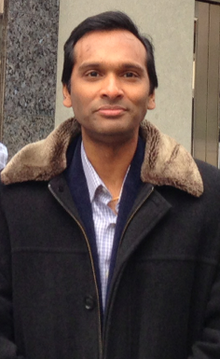Arul Chinnaiyan
Arul Chinnaiyan | |
|---|---|
 | |
| Alma mater | University of Michigan Medical School |
| Known for | Cancer Research |
| Scientific career | |
| Institutions | University of Michigan Medical School, Howard Hughes Medical Institute |
Arul Chinnaiyan is a Hicks Endowed Professor of Pathology and professor of pathology and urology at the University of Michigan Medical School.[1] He is also a Howard Hughes medical Investigator (HHMI) at the Howard Hughes Medical Institute.[2]
Arul Chinnaiyan received both PhD and MD degrees at the University of Michigan Medical School in 1999. He is a cancer researcher and the recipient of the 28th annual American Association for Cancer Research Award for Outstanding Achievement in Cancer Research at the annual meeting of the AACR in April 2008 in San Diego.[3] He was also the leader of a group of scientists who received the inaugural 2007 American Association for Cancer Research "Team Science" Award for their discovery of gene fusions in prostate cancer.[4]
Arul Chinnaiyan received a number of other awards and prizes, including the Burroughs Wellcome Fund Clinical Scientist Award in Translational Research and of the Ramzi Cotran Young Investigator Award from the United States and Canadian Academy of Pathology. He is an elected member of the American Society for Clinical Investigation.[5]
Research and discovery
The focus of his research is molecular profiling of cancer to discover novel diagnostic markers and therapeutic targets. It is generally believed that blood cancers are caused by chromosome translocation such as Bcr-Abl in chronic myelogenous leukaemia (CML), whereas solid tumors are caused by mutations in growth or tumour suppressor genes. In research which challenges the current dogma, Arul has discovered chromosome translocation in solid prostate tumours. Arul has discovered that this translocation occurs between a male hormone related gene TMPRSS2 and transcription factors of the Erythroblast transformation specific (ETS) family.[6]
Publications
Partial list:
- Hu M, Yu J, Taylor JM, Chinnaiyan AM, Qin ZS. On the detection and refinement of transcription factor binding sites using ChIP-Seq data. Nucleic Acids Res. 2010 Jan 6. doi:10.1093/nar/gkp1180 PMID 20056654
- KLF6-SV1 overexpression accelerates human and mouse prostate cancer progression and metastasis. Narla G, DiFeo A, Fernandez Y, Dhanasekaran S, Huang F, Sangodkar J, Hod E, Leake D, Friedman SL, Hall SJ, Chinnaiyan AM, Gerald WL, Rubin MA, Martignetti JA" J Clin Invest 2008 Aug;118(8):2711-21. doi:10.1172/JCI34780 PMID 18596922
- Prensner JR, Chinnaiyan AM. A FIRE-y PAGE in the computational analysis of cancer profiles. Mol Cell. 2009 Dec 11;36(5):732-3.doi:10.1016/j.molcel.2009.11.019 PMID 20005836
- Khan AP, Poisson LM, Bhat VB, Fermin D, Zhao R, Kalyana-Sundaram S, Michailidis G, Nesvizhskii AI, Omenn GS, Chinnaiyan AM, Sreekumar A. Quantitative Proteomic Profiling of Prostate Cancer Reveals a Role for miR-128 in Prostate Cancer. Mol Cell Proteomics. 2010 Feb;9(2):298–312. Epub 2009 Nov 9.doi:10.1074/mcp.M900159-MCP200 PMID 19955085
- From bytes to bedside: data integration and computational biology for translational cancer research. Mathew JP, Taylor BS, Bader GD, Pyarajan S, Antoniotti M, Chinnaiyan AM, Sander C, Burakoff SJ, Mishra B. PLoS Computational Biology, 2007 doi:10.1371/journal.pcbi.0030012 PMID 17319736
- Ateeq B, Tomlins SA, Chinnaiyan AM. AGTR1 as a therapeutic target in ER-positive and ERBB2-negative breast cancer cases. Cell Cycle. 2009 Dec;8(23):3794-5. PMID 19934656
- Mani RS, Tomlins SA, Callahan K, Ghosh A, Nyati MK, Varambally S, Palanisamy N, Chinnaiyan AM. Induced chromosomal proximity and gene fusions in prostate cancer. Science. 2009 Nov 27;326(5957):1230. Epub 2009 Oct 29. doi:10.1126/science.1178124 PMID 19933109
- Wang XS, Prensner JR, Chen G, Cao Q, Han B, Dhanasekaran SM, Ponnala R, Cao X, Varambally S, Thomas DG, Giordano TJ, Beer DG, Palanisamy N, Sartor MA, Omenn GS, Chinnaiyan AM. An integrative approach to reveal driver gene fusions from paired-end sequencing data in cancer" Nat Biotechnol 2009 Nov;27(11):1005–11. Epub 2009 Nov 1.doi:10.1038/nbt.1584 PMID 19881495
- Vellaichamy A, Sreekumar A, Strahler JR, Rajendiran T, Yu J, Varambally S, Li Y, Omenn GS, Chinnaiyan AM, Nesvizhskii AI. Proteomic interrogation of androgen action in prostate cancer cells reveals roles of aminoacyl tRNA synthetases. PLoS One. 2009 Sep 18;4(9):e7075.doi:10.1371/journal.pone.0007075 PMID 19763266
- Gust KM, Hofer MD, Perner SR, Kim R, Chinnaiyan AM, Varambally S, Moller P, Rinnab L, Rubin MA, Greiner J, Schmitt M, Kuefer R, Ringhoffer M. RHAMM (CD168) is overexpressed at the protein level and may constitute an immunogenic antigen in advanced prostate cancer disease. Neoplasia. 2009 Sep;11(9):956-63.PMID 19724689
- Khodadoust MS, Verhaegen M, Kappes F, Riveiro-Falkenbach E, Cigudosa JC, Kim DS, Chinnaiyan AM, Markovitz DM, Soengas MS. Melanoma proliferation and chemoresistance controlled by the DEK oncogene. Cancer Res. 2009 Aug 15;69(16):6405-13.doi:10.1158/0008-5472.CAN-09-1063 PMID 19679545 ub 2009 Jul 10.
References
- ^ University of Michigan Medical School Department of Pathology website
- ^ HHMI: Arul M. Chinnaiyan, M.D., Ph.D
- ^ List of AACR Award for Outstanding Achievement in Cancer Research Winners Archived 5 May 2008 at the Wayback Machine
- ^ AACR Team Science Award Recipients, American Association for Cancer Research Award citation:"In recognition of their landmark discovery of recurrent gene fusions in a majority of prostate cancers, which has profound clinical and biological implications for understanding prostate cancers, and their embodiment of team science through interdisciplinary and inter-institutional collaboration."
- ^ 2 UMHS researchers selected as Howard Hughes Medical Institute investigators. Archived 21 April 2008 at the Wayback Machine University of Michigan Health System Press Release. 12 October 2007
- ^ Distinct classes of chromosomal rearrangements cre...[Nature. 2007] – PubMed Result
